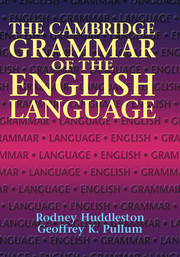Book contents
- Frontmatter
- Contents
- List of contributors
- Notational conventions
- Tree diagrams
- Preface
- 1 Preliminaries
- 2 Syntactic overview
- 3 The verb
- 4 The clause: complements
- 5 Nouns and noun phrases
- 6 Adjectives and adverbs
- 7 Prepositions and preposition phrases
- 8 The clause: adjuncts
- 9 Negation
- 10 Clause type and illocutionary force
- 11 Content clauses and reported speech
- 12 Relative constructions and unbounded dependencies
- 13 Comparative constructions
- 14 Non-finite and verbless clauses
- 15 Coordination and supplementation
- 16 Information packaging
- 17 Deixis and anaphora
- 18 Inflectional morphology and related matters
- 19 Lexical word-formation
- 20 Punctuation
- Further reading
- Index
- Lexical index
- Conceptual index
11 - Content clauses and reported speech
Published online by Cambridge University Press: 26 May 2017
- Frontmatter
- Contents
- List of contributors
- Notational conventions
- Tree diagrams
- Preface
- 1 Preliminaries
- 2 Syntactic overview
- 3 The verb
- 4 The clause: complements
- 5 Nouns and noun phrases
- 6 Adjectives and adverbs
- 7 Prepositions and preposition phrases
- 8 The clause: adjuncts
- 9 Negation
- 10 Clause type and illocutionary force
- 11 Content clauses and reported speech
- 12 Relative constructions and unbounded dependencies
- 13 Comparative constructions
- 14 Non-finite and verbless clauses
- 15 Coordination and supplementation
- 16 Information packaging
- 17 Deixis and anaphora
- 18 Inflectional morphology and related matters
- 19 Lexical word-formation
- 20 Punctuation
- Further reading
- Index
- Lexical index
- Conceptual index
Summary
This chapter is concerned with one of the three major classes of finite subordinate clause; the other two classes, relative and comparative clauses, are covered in the next two chapters, while non-finite subordinate clauses are the topic of Ch. 14.
Subordinate clauses
A subordinate clause characteristically functions as dependent within some larger construction:
[1] i [The book she recommended] is out of print.
ii He [knows that she is right].
iii [Although the paper is poorly written,]it contains some excellent ideas.
The underlined clause is modifier of the noun book in [i], complement of knows in [ii], and complement of although in [iii]. Note that in [iii] it contains some excellent ideas is a clause contained within a larger construction (the clause that forms the whole sentence), but it has the function of head, and hence is a main clause, not a subordinate one.
◼ Marking of subordination
Subordination is very often marked by some feature in the internal structure of the clause:
[2] i It is clear [that he made a mistake].
ii They interviewed all those [she mentioned in her affidavit].
iii She's asking [how many copies we will want].
One very simple case is illustrated in [i], where that serves directly to mark the clause as subordinate. In [ii] it is the absence of the understood object that distinguishes the subordinate clause from a main clause. And in [iii] what marks the clause as subordinate is the combination of a prenuclear interrogative phrase and the subject + predicator order, for the corresponding main clause has subject–auxiliary inversion (How many copies will we want?).
Not all subordinate clauses are structurally marked as such
English does not require that subordination be marked in the structure of the subordinate clause itself. In He knows she is right, for example, the underlined clause is subordinate by virtue of functioning as complement to know but it is structurally identical to the main clause She is right. We examine the conditions under which the marking is omissible in §3.1.
- Type
- Chapter
- Information
- The Cambridge Grammar of the English Language , pp. 947 - 1030Publisher: Cambridge University PressPrint publication year: 2002
- 7
- Cited by



